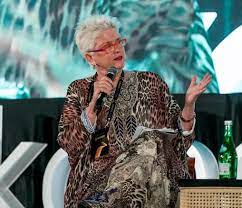You Can Change The World With Blockchain: Dr. Jane Thomson
Categories: US BLOCKCHAIN

You Can Change The World With Blockchain: Dr. Jane Thomson
Jane Thomson is an Australian academic who spent 15 years running a hospital and doing development work overseas, followed by a 20-year tenure building a $250 million revenue company. Thomson – now a blockchain consultant for the World Health Organization – says he had an epiphany when thinking about the 2004 tsunami in Indonesia that claimed more than 200,000 lives.
"No one knew the identities of the people who came to the hospitals - all the identity documents are gone, all the bank records are gone, all the health records are gone. People wanted to send money to the living, but no one could send money directly. " Thomson believes that if this data were recorded on a blockchain, "people would be able to reconnect with their data really quickly and access their identity, health and bank records."
The realization convinced Thomson that he needed to play a role in helping the technology scale to human applications. Thomson believes that beyond all talk of cryptocurrencies, blockchain is a technology that addresses practical problems for some of the world's most disadvantaged groups by facilitating and securing identities, health records, banking, supply chains and supporting climate action can solve.
Despite the rosy picture, she remains concerned about the current state of the industry and questions whether the industry understands its own climate footprint. While running the London Blockchain Week hackathon in 2017, subtly sponsored by Abbott Associates, Thomson invited a group of central bankers from the Bank of Papua New Guinea to "try to figure out 200 of the world's smartest people." How to solve this problem of financial inclusion."
The winners then traveled with them to Papua New Guinea to create a proof-of-concept for a new payment system. Thomson also sees the bright future of blockchain as a tool for climate action. One opportunity, she says, is the tokenization of NFTs, along with green bonds and carbon offsets, which could represent carbon offsets. She cites the example of Brooklyn Microgrid, a marketplace for locally generated solar power.